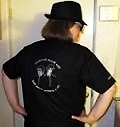 By CYNTHIA BIDDLECOMB
By CYNTHIA BIDDLECOMB“Selma” is the new feature film about the efforts of Dr. Martin Luther King Jr. and the Southern Christian Leadership Conference to force southern states to adapt to the 1964 Voting Rights Act.
Selma is not a documentary. It is a film meant to remind us what folks sacrificed to get a universal right to vote not only enacted but respected throughout this country.
 Movie poster of ‘Selma.’ Courtesy/rottentomatoes.com
Movie poster of ‘Selma.’ Courtesy/rottentomatoes.com
David Oyelowo (Interstellar, The Butler) plays Dr. King with the depth of faith, sensitivity and gravitas necessary to be convincing. Carmen Ejogo plays Coretta Scott King, in a role she reprises from the 2001 movie “Boycott.”
In “Selma,” King is surrounded by members of the Southern Christian Leadership Conference: Andre Holland as Andrew Young, Colman Domingo as Ralph Abernathy, Omar J. Dorsey as James Orange, Tessa Thompson as Diane Nash, Common as James Bevel, Ruben Santiago-Hudson as Bayard Rustin, and Stephan James as the young John Lewis, a leader of the Student Non-Violent Coordinating Committee.
This inner circle of the movement was committed to seeing the rights of black citizens respected in a nation that they understood to prize justice and liberty for all.
The film opens with Dr. King preparing to receive his Nobel Peace Prize for non-violent social action. On his return to the States, he has an audience with President Johnson (played expertly by Tom Wilkerson), trying to convince the President that enforcement of the Voting Rights Act must be his next policy effort.
Many historians maintain that Johnson is improperly portrayed in this film. Tapes of conversations between the two men prove that he was more than supportive of King’s efforts. At least, the film shows Johnson trying to calm J. Edgar Hoover (Dylan Baker) and attempting to rein in Alabama Gov. George Wallace (Tim Roth).
Director Ava DuVernay chose, in this film, to turn the spotlight on the sacrifices of the people in the center of the voting rights movement. She does not shy away from showing the extremes of violence visited upon non-violent protestors gathered in front of the Selma Courthouse, or those first marchers crossing the Edmund Pettus Bridge, nor from the violent deaths of Jimmie Lee Jackson, a young man protecting his 82-year-old grandfather, and of the Rev. James Reeb, a white minister from Boston beat to death by white racists. Oprah Winfrey has a role, early in this film, as Annie Lee Cooper, a Selma woman who had attempted many times to register to vote at that courthouse and was later beaten in the protest action in front of it.
Selma portrays a piece of our national history, which we must not forget, especially when poor and non-white citizens are finding it more and more difficult to vote. It is important, given this reality, for young people, or anyone who wasn’t around in 1965, to see this PG-13 rated film. The right to vote is not to be taken for granted.

